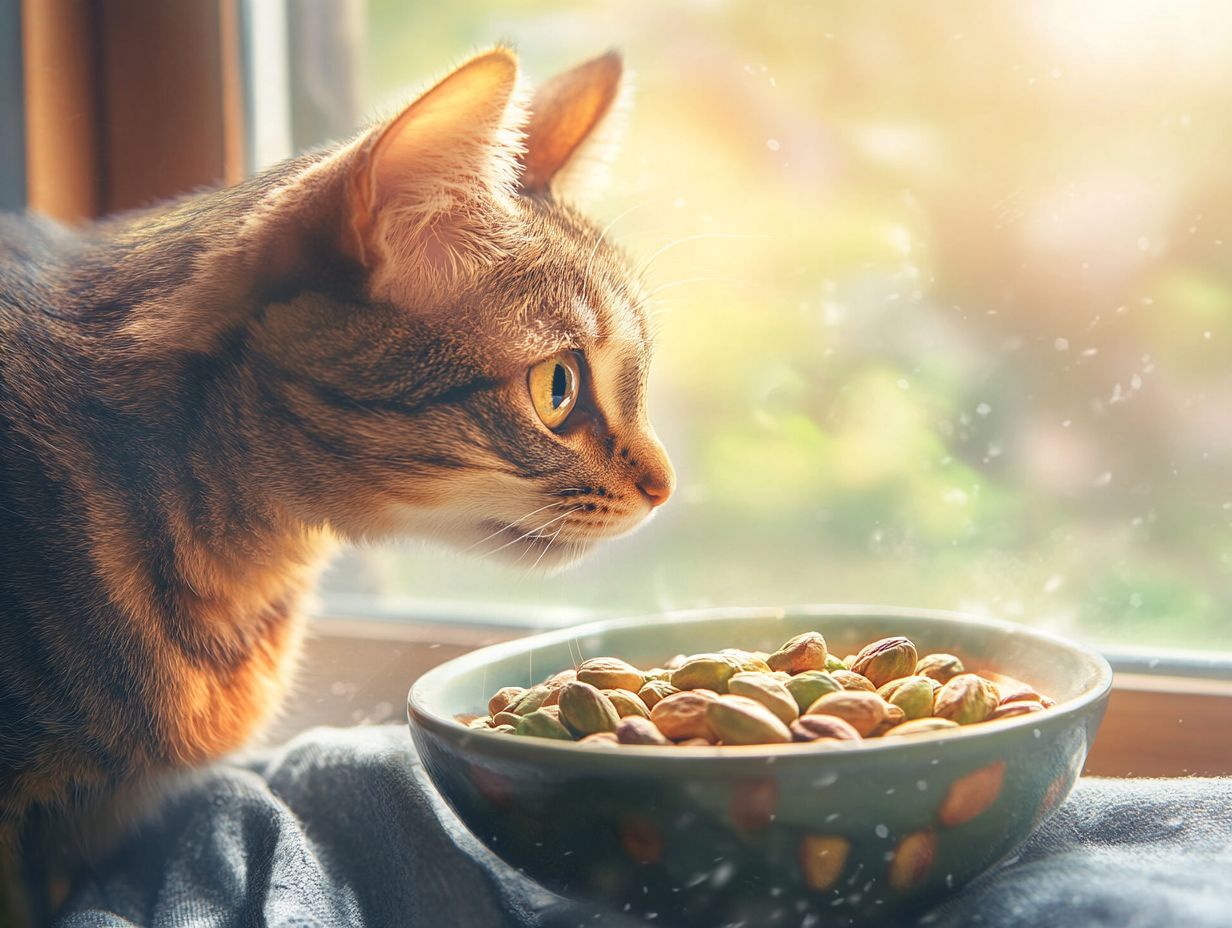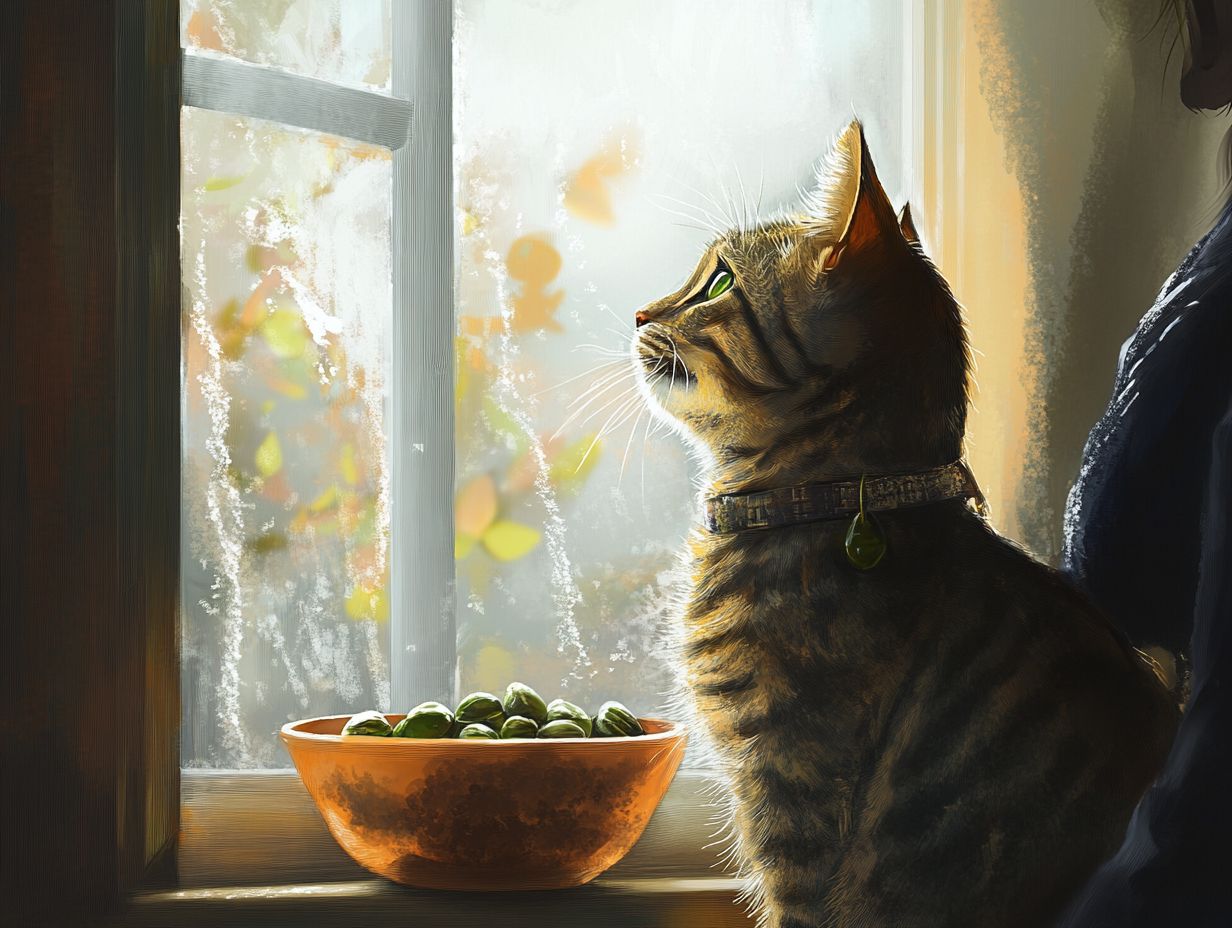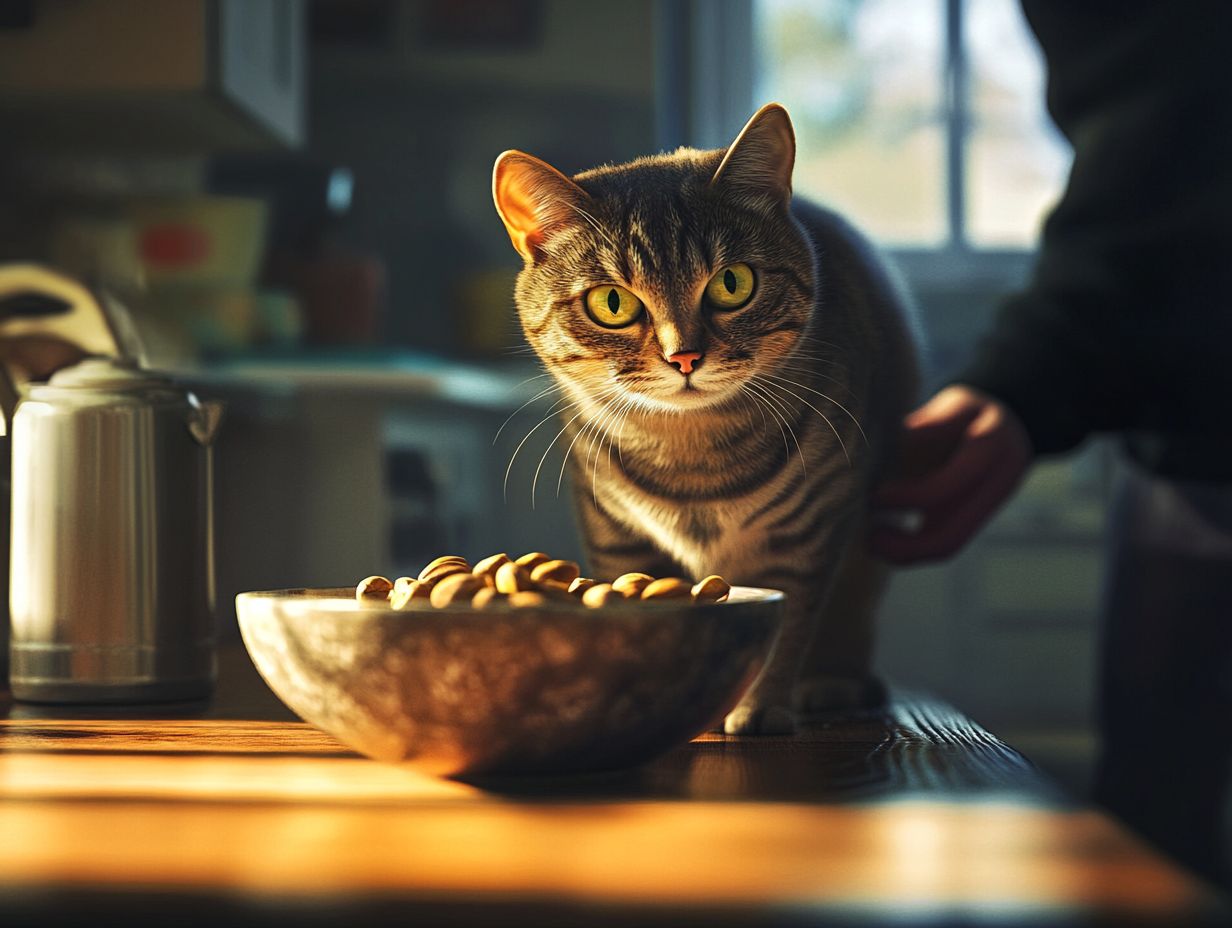Curious about whether your feline friend can enjoy pistachios? While these tasty nuts may seem like a fun treat, there are important considerations for cat owners regarding cat nutrition, especially considering the potential health risks. Cats need a diet primarily made of meat, and pistachios, despite containing some beneficial nutrients, can pose serious risks to your cat’s health.
This article explores the health risks associated with feeding pistachios to cats, which include choking hazards and digestive issues. It will also provide safe alternatives that offer nutritious options for your pet, such as pumpkin and peas, along with guidelines on portion control and monitoring.
Discover everything you need to know to keep your cat safe and healthy! Learn about the importance of a balanced animal diet and the role of high-quality food in maintaining cat safety.
Key Takeaways:

- Feeding pistachios to cats can cause serious health risks, including choking and conditions like pancreatitis and obesity.
- Safe and nutritious alternatives include cooked meat or fish and high-quality commercial cat treats.
- Limit treats to a small piece (e.g., one teaspoon of cooked chicken or turkey) and monitor your cat for adverse reactions.
Can Cats Eat Pistachios?
Cats require a diet primarily composed of meat. However, some pet owners may wonder if their feline companions can enjoy pistachios as a special treat.
While these nuts contain beneficial nutrients like healthy fats and antioxidants, they also pose several risks. Their high phosphorus content can be problematic for cats with certain medical conditions. Prioritizing high-quality, meat-based foods is essential, as cats thrive on protein rather than plant matter.
A diet focused on meat ensures optimal health, while treats like pistachios, although enjoyable, should be approached with caution. Not all nuts are safe for cats, and moderation is key to preventing gastrointestinal upset—making careful consideration crucial for every pet owner.
Potential Risks of Feeding Pistachios to Cats
Pistachios are not suitable for cats. While their flavor and texture may seem appealing, they can lead to serious health complications.
- Choking Hazards: The hard shells of pistachios can lead to choking and blockages in a cat’s digestive system.
- Health Complications: Risks include pancreatitis, obesity, and gastrointestinal issues like gas.
- Intestinal Blockages: Eating hard objects like pistachio shells can easily lead to intestinal blockages, resulting in serious complications.
Proper care and monitoring by a veterinarian can help mitigate these risks. For more information on what foods are safe for cats, check out this article on Can Cats Eat Pistachios? What Cat Owners Should Know.
To ensure your cat remains healthy while snacking, it is best to offer human foods that are safe for them, like small portions of cooked chicken or turkey, or snacks specifically formulated for cats.
Conclusion
While pistachios may be tasty for humans, it’s best to stick to safe treats designed for cats to ensure their health and safety. Prioritize a balanced diet focused on high-quality, meat-based foods, and consult with a veterinarian for the best dietary advice for your cat.
Pistachios can be harmful to cats due to their high fat content, which can lead to obesity and pancreatitis. As cats need meat in their diet, providing high-fat snacks can disrupt their specialized nutrition, resulting in severe health problems. Understanding the negative nutritional consequences of offering such treats is crucial.
Health Risks of Feeding Cats Pistachios
With approximately 13 grams of fat per ounce, pistachios can cause rapid weight gain in cats. While healthy fats are necessary in moderation, excessive fat can easily surpass a cat’s daily caloric requirements, leading to obesity—a condition associated with various health issues, including diabetes and joint problems.
Furthermore, the rich fat content can lead to pancreatitis, an inflammation of the pancreas often causing severe abdominal pain and vomiting, which can be fatal. This concern emphasizes the dangers of including pistachios in a cat’s diet.
It is essential to feed cats a diet that meets their nutritional needs, avoiding high-fat snacks like pistachios.
Safe Alternatives to Pistachios
Yes, there are safe and nutritious alternatives to pistachios for cats. Many of these options provide enjoyable flavors and nutritional benefits without the risks associated with feeding cats pistachios.
Most cat owners choose to offer their pets high-quality cat food and specially formulated treats designed specifically for cats, ensuring they receive proper nutrition while minimizing potential health risks.
Safe and Nutritious Treat Options
When treating your cat, consider ingredients that offer enjoyment and health benefits while avoiding the dangers of pistachios. Alternatives like pumpkin and peas are excellent choices, providing fiber and essential nutrients that support heart health and overall well-being. You can prepare pumpkin by steaming or roasting, and peas can be served cooked and mashed.
Pumpkin is rich in antioxidants and aids digestion, making it an excellent ingredient for promoting gastrointestinal health. Peas are a good source of protein and contain vitamins A, B, and K, beneficial for maintaining a strong immune system and healthy skin.
These natural ingredients can be incorporated into their regular diet more safely than human snacks, offering a delightful way to enhance their nutrition while steering clear of potential hazards.
Guidelines for Feeding Cats Pistachios
Feeding your cat pistachios requires extreme caution, as even small amounts can result in serious health issues. If you must introduce them, portion control is essential. A very small piece, no larger than a pea, could be considered, but it’s advisable to consult with a veterinary expert before doing so.
Portion Control and Monitoring

Proper portion control and monitoring are crucial. Cats have delicate digestive systems, and overconsumption can quickly lead to serious health issues. It is advisable to offer these nuts in very small amounts to ensure a safe and enjoyable experience, closely monitoring their treat intake.
During this adjustment period, observe your cat’s behavior, focusing on appetite levels, signs of unusual lethargy, and gastrointestinal distress, such as vomiting. If any of these symptoms occur, it is vital to adjust portion size or consider eliminating pistachios from their diet altogether.
Regular monitoring is essential for ensuring both the safety of your cat’s health and the establishment of a balanced diet that includes treats without compromising overall well-being.
Final Thoughts and Recommendations
When evaluating the risks and benefits of sharing pistachios with your cat, prioritize their health. Opt for only high-quality cat food and appropriate treats that cater to their dietary needs while avoiding unnecessary health risks. Always remember, safe alternatives like pumpkin and peas are much better choices.
As a cat owner, it’s crucial to understand which human foods are safe for your feline friend. This article explores whether cats can eat pistachios and what the potential risks and benefits are. Some human foods can be very dangerous, so pet owners must be aware of what is safe and what is not for their animals. For example, macadamia nuts and walnuts are harmful to cats. Opt for cat treats formulated to meet their specific nutritional needs without the potential dangers of other options. Always check food ingredient labels and consult with a veterinarian before introducing anything new to your cat’s diet.
Prioritizing your pet’s health and safety ensures their well-being and gives owners peace of mind, knowing they contribute to a long and happy life together.
Additionally, some studies have shown that pistachios, which are drupes, can impact the digestive system of cats.
Frequently Asked Questions
Can cats eat pistachios?
It is not recommended for cats to eat pistachios as they can cause digestive issues and may pose health risks.
What should cat owners know about feeding their cats pistachios?

Cat owners should know that pistachios are not part of a cat’s natural diet and can be harmful to their health if consumed regularly. The high fat content can pose health risks.
What are the potential dangers of cats eating pistachios?
Pistachios can cause digestive upset, including vomiting and diarrhea, in cats. They can also pose a choking hazard from their shells and seasoning. Additionally, their high fat and salt content can be detrimental to feline health.
Are there any health benefits for cats eating pistachios?
No, there are no known health benefits for cats, as pistachios do not provide essential nutrients like potassium, calcium, or amino acids necessary for their well-being. Cats have specific dietary needs, and a balanced cat food is crucial.
Can cats eat pistachios in moderation, and how does pistachio nutrition affect them?
It is not recommended for cats to eat pistachios, even in moderation, due to the potential for digestive upset, pancreatitis, and other health risks. If you wish to treat your cat, small amounts of plant-based snacks like peas or pumpkin can be offered occasionally. A tablespoon is often a safe portion.
What should I do if my cat accidentally eats pistachios?
If your cat accidentally consumes a few pistachios, monitor them for any signs of digestive upset such as vomiting or diarrhea. Contact your veterinarian if symptoms persist. Additionally, it’s wise to limit their food intake for the next 24 hours to allow their stomach to settle. Remember that while some nuts like macadamia nuts and walnuts are toxic, pistachios are generally non-toxic but not recommended.
Always prioritize your cat’s health by providing safe, veterinarian-approved treats and minimizing risky human foods.